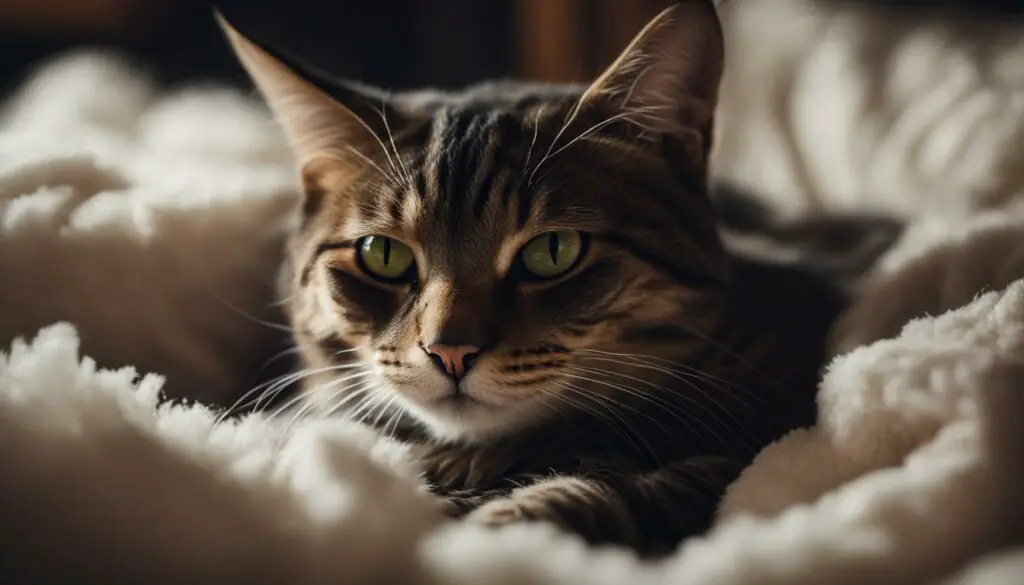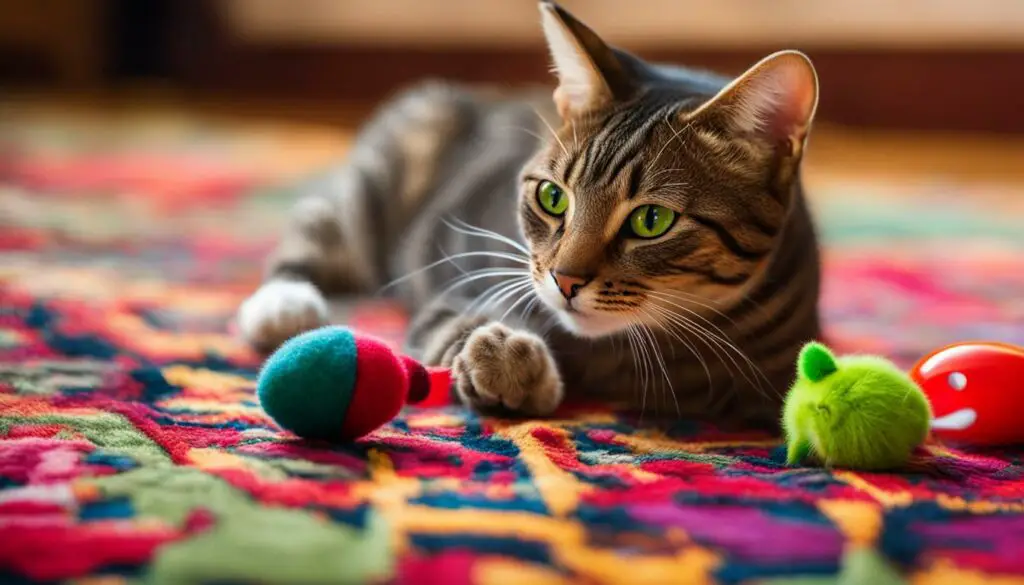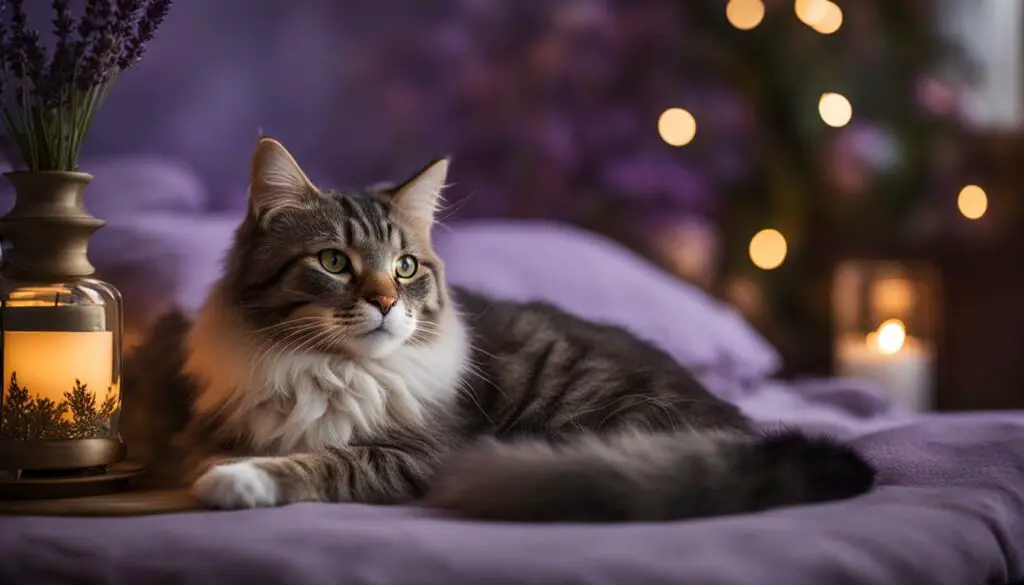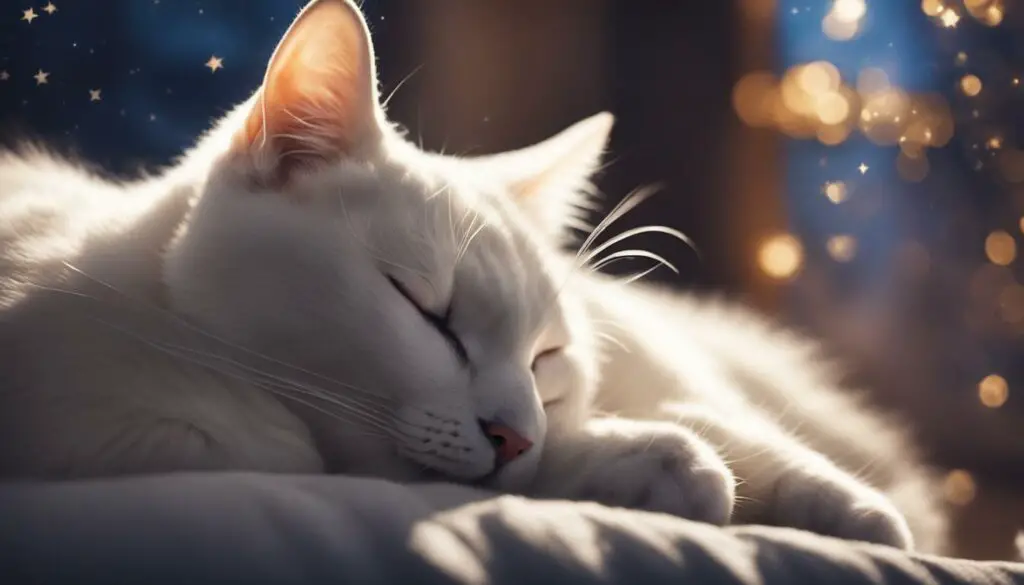Many cat owners struggle with their feline companions meowing at night, causing sleepless nights and frustration. Understanding the reasons behind this behavior and finding effective solutions can help both you and your cat have a peaceful night’s sleep.
Key Takeaways:
- Identify the underlying cause of your cat’s nighttime meowing to address the issue effectively.
- Engage your cat in playful activities before bedtime to exhaust their energy and promote better sleep at night.
- Adjust your cat’s feeding and playtime schedules to align with their natural body clock.
- Consult a veterinarian if your cat’s meowing is accompanied by other signs of discomfort or illness.
- Create a safe and stimulating environment for your cat to reduce anxiety and promote a peaceful night’s sleep.
Common Reasons Why Cats Meow at Night
When your cat keeps meowing at night, it can be frustrating and disruptive to your sleep. Understanding the reasons behind this behavior can help you find effective solutions to address the issue. There are several common reasons why cats meow at night:
- Boredom: Cats that are bored during the day may become more active and vocal at night. They may meow as a way to seek attention or engage in play. Providing stimulating activities and interactive toys during the day can help alleviate boredom and reduce nighttime meowing.
- Natural Body Clock: Cats are crepuscular by nature, meaning they are most active during dawn and dusk. This natural instinct can cause them to be more active and vocal at night. Adjusting their feeding and playtime schedules to align with their internal clock can help reset their sleep-wake cycle and lessen nighttime meowing.
- Illness or Pain: Cats may meow at night if they are experiencing discomfort or pain due to an underlying medical condition. It’s important to monitor your cat for any signs of illness or changes in behavior and consult a veterinarian if necessary.
- Aging: Older cats may develop cognitive dysfunction syndrome, which can lead to anxiety or confusion at night. This may result in increased meowing as they seek reassurance or attention. Creating a safe and familiar environment for your senior cat can help reduce nighttime anxiety.
- Feeling Trapped Indoors: Cats that are kept exclusively indoors may meow at night as a way to express their frustration or desire to go outside. Providing environmental enrichment, such as scratching posts or window perches, can help alleviate their restlessness and reduce nighttime meowing.
By identifying the underlying cause of your cat’s nighttime meowing, you can implement targeted strategies to address the issue effectively. The table below summarizes the common reasons why cats meow at night:
| Reasons | Description |
|---|---|
| Boredom | Cats may meow at night due to lack of stimulation during the day. Providing interactive toys and activities can help alleviate boredom. |
| Natural Body Clock | Cats are most active during dawn and dusk, which can contribute to nighttime meowing. Aligning their schedule with their natural instincts can help reset their sleep-wake cycle. |
| Illness or Pain | Cats may meow at night if they are experiencing discomfort or pain. Monitoring their behavior and consulting a veterinarian is important. |
| Aging | Senior cats may meow at night due to anxiety or confusion associated with cognitive dysfunction syndrome. Creating a familiar and secure environment can help alleviate nighttime anxiety. |
| Feeling Trapped Indoors | Cats that are kept indoors may meow at night to express their desire to go outside. Providing environmental enrichment can help reduce restlessness. |
Addressing the specific cause of your cat’s nighttime meowing can lead to a more peaceful and restful night for both you and your feline companion.
Addressing Boredom to Reduce Nighttime Meowing
Cats that meow excessively at night may be exhibiting signs of boredom. Engaging them in stimulating activities during the day can help reduce their nighttime meowing. One effective strategy is to provide interactive toys that encourage play and mental stimulation. This not only helps to exhaust their excess energy but also keeps them entertained and mentally engaged.
Additionally, incorporating playtime sessions into your cat’s daily routine can help tire them out before bedtime. Spend time playing with your cat using toys that simulate hunting and pouncing behaviors. This not only provides physical exercise but also helps satisfy their natural instincts.
Creating a stimulating environment for your cat can also reduce boredom and minimize nighttime meowing. Consider placing scratching posts, climbing trees, and perches strategically throughout your home. These allow your cat to engage in natural behaviors and explore their surroundings. You can also rotate and introduce new toys periodically to keep their interest piqued.
Benefits of Addressing Boredom:
- Reduces excessive meowing at night
- Promotes better sleep for both you and your cat
- Helps to exhaust your cat’s energy
- Provides mental stimulation and entertainment
Remember, addressing boredom is just one approach to reducing nighttime meowing. It’s important to consider other possible reasons for your cat’s behavior and address them accordingly. By creating a stimulating environment and engaging in interactive play, you can help curb your cat’s boredom and promote a more peaceful night’s sleep for both of you.
| Tip | Description |
|---|---|
| Provide puzzle feeders | These toys dispense small amounts of food throughout the day, encouraging your cat to work for their meals and keeping them mentally stimulated. |
| Set up a window perch | Place a comfortable perch near a window so your cat can watch birds or other outdoor activities, providing visual stimulation. |
| Rotate toys | Swap out toys regularly to maintain your cat’s interest and prevent boredom. |

Managing the Body Clock for a Peaceful Night’s Sleep
One of the common reasons why cats meow excessively at night is their natural body clock. Cats are naturally more active during certain hours, particularly at dusk and dawn. Understanding and managing their body clock can help reduce their nighttime meowing and promote a peaceful night’s sleep for both you and your feline companion.
To align your cat’s schedule with their natural instincts, consider adjusting their feeding and playtime routines. Playtime sessions in the evening can help tire them out and expend their energy, making them more likely to sleep through the night. Additionally, feeding them their main meal closer to bedtime can mimic their natural hunting behavior, further promoting restfulness.
Creating a calm and soothing environment before bedtime can also help regulate their body clock. Provide a warm and comfortable sleeping area and keep the lights dim to signal nighttime. Avoid engaging in stimulating activities or play during the late evening to encourage relaxation and prepare them for sleep.
Promoting a Consistent Routine
Establishing a consistent routine is key to managing your cat’s body clock. Cats thrive on predictability and feel more secure when they have a regular schedule. Try to feed them, play with them, and provide attention and affection at the same times each day. Over time, they will become accustomed to the routine and adjust their natural instincts accordingly.
| Sleep Tips for Cats | Sleep Tips for Cat Owners |
|---|---|
| Keep a consistent bedtime routine for your cat. | Create a calm and comfortable sleeping environment for yourself. |
| Engage in interactive play sessions to tire them out before bedtime. | Establish a regular sleep schedule for yourself. |
| Feed your cat a main meal closer to bedtime to promote restfulness. | Avoid engaging in stimulating activities before bed, such as using electronic devices. |
| Ensure your cat has a warm and comfortable sleeping area. | Avoid responding to your cat’s meowing during the night to discourage attention-seeking behavior. |
By managing your cat’s body clock and promoting a consistent routine, you can help reduce their excessive meowing at night and create a peaceful sleeping environment for both of you. It may take time for your cat to adjust, so be patient and consistent in implementing these strategies.

Identifying and Addressing Health Issues
When your cat won’t stop meowing at night, it’s important to consider potential underlying health issues that could be causing this behavior. While some cats may meow for attention or out of boredom, persistent nighttime meowing accompanied by other signs of discomfort or illness should be taken seriously. Consulting a veterinarian is crucial to determine the cause and provide appropriate medical intervention.
Common health issues that can contribute to nighttime meowing include pain, cognitive dysfunction syndrome (CDS), and hormonal changes. Cats in pain may vocalize more frequently, especially during the quiet hours of the night when external distractions are minimal. CDS, which is similar to Alzheimer’s disease in humans, can cause confusion and anxiety in older cats, leading to increased meowing. Hormonal changes, such as those seen in unspayed female cats, can also result in excessive vocalization.
During a veterinary consultation, the veterinarian will conduct a thorough examination and may recommend additional diagnostic tests. These tests can help identify any underlying medical conditions that could be contributing to the nighttime meowing. Once a diagnosis is made, appropriate treatment options can be discussed and implemented to address the health issues and alleviate the meowing behavior.
Signs of Health Issues in Cats:
- Persistent nighttime meowing
- Changes in appetite or weight
- Inappropriate elimination
- Lethargy or decreased activity
- Changes in grooming habits
- Increased thirst or urination
Remember, if your cat’s nighttime meowing is accompanied by any of these signs, it’s important to seek veterinary advice promptly. Your veterinarian is the best resource for identifying and addressing any potential health issues that may be affecting your cat’s behavior and overall well-being.
| Common Health Issues Contributing to Nighttime Meowing | Signs and Symptoms |
|---|---|
| Pain | Vocalization, changes in behavior, decreased appetite |
| Cognitive Dysfunction Syndrome (CDS) | Confusion, disorientation, increased anxiety |
| Hormonal changes | Excessive vocalization, restlessness |

Consulting a veterinarian is crucial to determine the cause and provide appropriate medical intervention.
Providing a Safe and Stimulating Environment
Creating a safe and stimulating environment is essential to help calm a meowing cat at night. By making a few adjustments, you can promote a sense of security and comfort for your feline companion, leading to a more peaceful night’s sleep for both of you.
Creating a Cozy Sleeping Space
Ensure that your cat has a designated sleeping area that is cozy and secure. This can be a comfortable cat bed or a soft blanket placed in a quiet corner of your home. Adding familiar scents, such as an unwashed t-shirt or a small piece of bedding, can further enhance feelings of security and help your cat relax.
Minimizing Potential Hazards
Take the time to thoroughly assess your cat’s environment and remove any potential hazards that might cause anxiety or stress. This can include loud noises, sudden movements, or objects that your cat may perceive as threatening. By creating a calm and clutter-free space, you can help alleviate any triggers that may contribute to excessive meowing at night.
Using Nightlights
Cats have excellent night vision, but a dimly lit environment can help create a soothing atmosphere. Consider placing nightlights in areas that are normally dark during the night. This can help your cat feel more secure and reduce any anxiety they may have about navigating their surroundings in the dark.
By implementing these strategies, you can create a safe and stimulating environment that promotes a sense of security for your cat. This, in turn, can help reduce excessive meowing at night and lead to more peaceful nights for both of you.
| Benefits of a Safe and Stimulating Environment |
|---|
| Provides a sense of security for your cat |
| Promotes relaxation and better sleep |
| Reduces anxiety and stress |
| Minimizes potential triggers for excessive meowing |
Remember, each cat is unique, so it may take some trial and error to find what works best for your feline companion. Patience and consistency are key when implementing these changes to create a calm and peaceful environment for your cat at night.

Nighttime Feeding and Hydration
When your cat won’t stop meowing at night, one possible reason could be hunger or thirst. Adjusting your cat’s feeding and hydration routine can help prevent hunger-related meowing and promote a more peaceful night’s sleep for both you and your feline companion.
One effective strategy is to include a late-night meal in your cat’s feeding schedule. Providing a small portion of food before bedtime can help satisfy their hunger and reduce the need to meow for attention. It’s important to ensure that the late-night meal is balanced and appropriate for your cat’s dietary needs.
In addition to regular meals, fresh water should be available to your cat at all times. Hydration is essential for maintaining their overall health and well-being. Consider placing multiple water bowls throughout your home to encourage drinking and minimize thirst-related meowing during the night.
Promoting Balanced Nutrition
Feeding your cat a balanced diet is crucial for their overall health and can contribute to a more peaceful night’s sleep. Consult with your veterinarian to determine the appropriate food type and portion size for your cat based on their age, weight, and any specific dietary requirements. Provide high-quality cat food that meets their nutritional needs and avoid overfeeding, as obesity can lead to additional health issues.

Remember to introduce any dietary changes gradually to prevent digestive upset. Consistency in feeding times and portion sizes can help establish a routine and reduce mealtime-related meowing.
| Benefits of Nighttime Feeding and Hydration: |
|---|
| Prevents hunger-related meowing |
| Satisfies your cat’s nutritional and hydration needs |
| Promotes a more peaceful night’s sleep |
| Contributes to your cat’s overall health and well-being |
By addressing your cat’s nighttime feeding and hydration needs, you can help reduce their meowing and ensure they are comfortable throughout the night. Remember to consult with your veterinarian for personalized advice and guidance specific to your cat’s individual needs.
Increasing Daytime Activity and Stimulation
One effective way to reduce your cat’s excessive meowing at night is to increase their daytime activity and stimulation. By providing engaging activities and mental enrichment during the day, you can help tire them out and promote better sleep at night. Here are some strategies to consider:
- Playtime sessions: Engage your cat in interactive play sessions with toys that encourage them to chase, pounce, and jump. This will help them burn off excess energy and stimulate their natural hunting instincts.
- Interactive toys: Invest in puzzle toys or treat-dispensing toys that require your cat to work for their food. This not only provides mental stimulation but also keeps them occupied and entertained.
- Scratching posts and climbing trees: Provide vertical spaces for your cat to explore and exercise. Scratching posts and climbing trees not only offer physical activity but also help satisfy their need to scratch and climb.
By incorporating these activities into your cat’s daily routine, you can help reduce their nighttime meowing. Remember to be consistent and offer a variety of options to keep them engaged and entertained.
Sample Table: Comparison of Daytime Activity and Stimulation
| Playtime Sessions | Interactive Toys | Scratching Posts and Climbing Trees | |
|---|---|---|---|
| Benefits | Physical exercise, mental stimulation, and bonding time with your cat. | Mental stimulation, problem-solving, and food rewards. | Physical exercise, stress relief, and territorial marking. |
| Examples | Feather wand, laser pointer, interactive rod toy. | Treat puzzle toys, rolling balls with treats inside. | Vertical scratching post, cat tree, wall-mounted shelves. |
| Frequency | At least twice a day, for 10-15 minutes each session. | Offer interactive toys throughout the day, rotating them to maintain novelty. | Provide multiple scratching posts and climbing options in different areas of your home. |
Remember, every cat is unique, so it may take some trial and error to find the activities that your cat enjoys the most. By increasing their daytime activity and stimulation, you can help them expend their energy and reduce excessive meowing at night.

Behavior Modification Techniques
When it comes to addressing your cat’s nighttime meowing, behavior modification techniques can be effective in helping to curb this behavior over time. It’s important to note that consistency and patience are key, as it may take some time for your cat to adjust to the new approach. Here are some techniques that you can try:
- Ignore the meowing: One approach is to ignore your cat’s meowing behavior altogether. This means not providing any attention or reinforcement when your cat is meowing. While the behavior may initially worsen as your cat tries to elicit a response, consistent non-response can help extinguish the meowing behavior over time.
- Provide alternative distractions: Another technique is to provide your cat with alternative distractions during nighttime hours. This can include engaging toys, interactive puzzles, or treats that keep your cat occupied and mentally stimulated. By redirecting their focus away from meowing, you can help break the habit of nighttime vocalization.
- Establish a bedtime routine: Creating a consistent bedtime routine can help signal to your cat that it’s time to settle down for the night. This can include activities such as playtime, grooming, and feeding. By establishing a calming routine, you can help reduce anxiety and promote a more peaceful sleep environment for your cat.
Remember, it’s important to stay patient and consistent with these behavior modification techniques. It may take time for your cat to adjust to the new routine and for the meowing behavior to diminish. If you’re unsure about which approach is best for your cat, consulting with a veterinarian or a professional cat behaviorist can provide additional guidance and support tailored to your cat’s specific needs.

Expert Tip:
“Behavior modification can be an effective tool in addressing excessive nighttime meowing. Remember to focus on positive reinforcement for desired behaviors and remain consistent in your approach. By working with your cat’s natural instincts and providing alternative outlets for energy and attention, you can help reduce nighttime vocalization and promote a more peaceful sleep environment for both you and your cat.”
| Technique | Effectiveness | Time Required |
|---|---|---|
| Ignoring the meowing | High | Varies (weeks to months) |
| Providing alternative distractions | Moderate | Varies (weeks to months) |
| Establishing a bedtime routine | Moderate | Several weeks |
By implementing behavior modification techniques and staying consistent, you can help address your cat’s nighttime meowing and create a more peaceful sleeping environment for both you and your feline companion.
Maintaining a Clean Litter Box
A dirty or uncomfortable litter box can contribute to your cat’s nighttime meowing. Cats are naturally clean animals, and they prefer a pristine environment for their toileting needs. If their litter box is dirty, they may express their discomfort through meowing at night. Regularly cleaning the litter box is essential to ensure your cat’s comfort and reduce any potential anxiety or stress associated with toileting.
To maintain a clean litter box, make sure to scoop it at least once a day, removing any clumps or waste. This not only keeps the litter box clean but also helps prevent unpleasant odors. If you use clumping litter, it’s important to scoop out the clumps promptly to ensure a fresh and inviting environment for your cat.
In addition to scooping, you should also consider completely changing the litter at least once a week. This helps maintain hygiene and ensures that your cat has a clean surface to use for their potty needs. When changing the litter, be sure to thoroughly clean the litter box with mild soap and water, rinsing it well before adding fresh litter.
| Benefits of a Clean Litter Box | Tips for Maintaining a Clean Litter Box |
|---|---|
| 1. Promotes your cat’s comfort and satisfaction | 1. Scoop the litter box daily |
| 2. Reduces potential stress and anxiety | 2. Change the litter at least once a week |
| 3. Minimizes litter box odors | 3. Thoroughly clean the litter box with mild soap and water |
| 4. Encourages consistent use of the litter box | 4. Provide multiple litter boxes for multiple cats |
Another important aspect to consider is the number of litter boxes available in your home. If you have multiple cats, it’s recommended to provide one litter box per cat, plus an additional one. This ensures that each cat has their own space and reduces the likelihood of territorial disputes or discomfort.
By maintaining a clean litter box, you create a welcoming and comfortable environment for your cat. This can help alleviate their nighttime meowing and promote a more peaceful night’s sleep for both you and your feline companion.
Seeking Veterinary Advice
If your cat’s nighttime meowing persists despite trying various solutions, it’s advisable to seek veterinary advice. A thorough examination by a veterinarian can help identify any underlying medical issues that may be causing the excessive meowing. It’s essential to rule out any health concerns or discomfort that your cat may be experiencing. By consulting a professional, you can get the necessary guidance and determine the most appropriate course of action to alleviate the behavior.
Veterinarians have the expertise to assess your cat’s overall health, conduct diagnostic tests if needed, and provide specific recommendations tailored to your cat’s individual needs. They may recommend further investigations or suggest changes to your cat’s diet, medication, or environmental enrichment. Seeking veterinary advice ensures that you’re taking the right steps to address your cat’s meowing behavior effectively.
Remember, your veterinarian is a valuable resource in helping you understand and manage your cat’s meowing. They can provide insights into the underlying causes, offer behavioral advice, and help you create a customized plan to address the issue. Don’t hesitate to reach out to them for professional assistance in improving your cat’s sleep and overall well-being.
When to Seek Veterinary Advice:
- If your cat’s nighttime meowing continues for an extended period
- If the meowing is accompanied by other concerning symptoms
- If you’ve tried various solutions without success
- If you’re unsure about the underlying cause of the meowing

| Signs that May Indicate the Need for Veterinary Evaluation | Possible Underlying Causes |
|---|---|
| Changes in appetite or eating habits | Pain, gastrointestinal issues, dental problems |
| Weight loss or gain | Metabolic disorders, hormonal imbalances |
| Change in litter box habits | Urinary tract infection, kidney disease, behavioral issues |
| Increase in thirst or urination | Diabetes, kidney disease, bladder issues |
| Visible signs of pain or discomfort | Injury, arthritis, dental problems |
Creating a Calming Environment for Senior Cats
As cats age, they may experience changes in vision, cognitive function, and overall comfort, which can lead to nighttime anxiety and excessive meowing. Creating a calming environment for senior cats is essential to promote better sleep and reduce their nighttime distress. Here are some strategies that can help:
1. Provide a Cozy and Secure Sleeping Space
Senior cats may benefit from having a designated sleeping area that provides a sense of security. Consider providing a soft and comfortable bed in a quiet corner of your home where your cat can retreat to at night. Adding a familiar blanket or piece of clothing with your scent can also provide a calming effect.
2. Use Nightlights to Improve Visibility
Dim lighting can make it difficult for senior cats to navigate their surroundings, especially during the nighttime. Placing nightlights in strategic areas can improve visibility and reduce anxiety. Ensure that the nightlights are not too bright, as excessive light can disrupt sleep.
3. Minimize Potential Hazards
Senior cats may be more prone to accidents or injuries, especially during the night. Take measures to ensure a safe environment by removing any potential hazards such as loose cords, sharp objects, or unstable furniture. Providing easy access to food, water, and litter box locations can also help minimize stress.
By creating a calming environment for your senior cat, you can help alleviate their nighttime anxiety and promote better sleep. Remember to observe your cat’s behavior closely and adapt the environment to their specific needs. Seeking guidance from a veterinarian can also provide valuable insights and recommendations tailored to your cat’s well-being.

| Benefits of Creating a Calming Environment for Senior Cats | Strategies to Implement |
|---|---|
| 1. Reduces anxiety and stress | – Provide a cozy and secure sleeping space – Use nightlights to improve visibility |
| 2. Promotes better sleep | – Minimize potential hazards – Create a familiar environment |
| 3. Enhances overall well-being | – Seek veterinary guidance for tailored recommendations |
Prioritizing Your Own Sleep
As much as we love our feline companions, it’s crucial to prioritize our own sleep. Constant meowing throughout the night can be exhausting and detrimental to our well-being. By implementing effective strategies and sticking to a routine, we can establish healthier sleep patterns for both ourselves and our cats. Here are some tips to help you get a restful night’s sleep:
1. Create a bedtime routine:
Establishing a consistent nighttime routine for your cat can signal that it’s time to wind down. Engage in a quiet play session, provide a comfortable sleeping space, and offer some calming activities like brushing or gentle petting. This routine will help your cat associate certain behaviors with bedtime and promote a more relaxed environment.
2. Consider earplugs or white noise:
If your cat’s meowing is particularly disruptive, using earplugs or playing soft white noise in your bedroom can help drown out the sound. This can create a more peaceful atmosphere and help you maintain uninterrupted sleep even if your cat continues to meow at night.
3. Seek support from a partner or family member:
If possible, enlist the help of a partner or family member to take turns addressing your cat’s needs at night. This can give you much-needed breaks and ensure that the responsibility of managing nighttime meowing is shared, allowing everyone in the household to get sufficient rest.
Remember, getting enough sleep is crucial for your overall well-being and ability to properly care for your cat. By implementing these strategies, you can prioritize your own sleep without compromising the well-being of your beloved feline friend.

| Table: Tips for Prioritizing Your Sleep |
|---|
| Create a bedtime routine |
| Consider earplugs or white noise |
| Seek support from a partner or family member |
Additional Resources for Cat Care
As a cat owner, finding the right resources to address your cat’s meowing behavior at night can make a significant difference in promoting a peaceful environment for both you and your feline companion. Here are some additional resources that can provide valuable support and guidance:
Veterinary Pharmacies
Veterinary pharmacies offer a wide range of products designed specifically for cats, including calming supplements, pheromone sprays, and anxiety-relief medications. Consulting with a veterinary pharmacist can help you explore safe and effective options to manage your cat’s nighttime meowing.
Cat Behaviorists
Cat behaviorists are experts who specialize in understanding feline behavior and providing customized solutions for various issues, including nighttime meowing. They can assess your cat’s specific situation, identify underlying triggers, and develop a tailored behavior modification plan to address the problem effectively.
Expert Advice
There are numerous online platforms and publications where you can find expert advice on cat care and behavior. Websites, blogs, and forums dedicated to feline health and behavior offer valuable insights from experienced professionals and fellow cat owners who have successfully dealt with similar challenges. These resources can provide practical tips, step-by-step guidance, and answers to frequently asked questions, helping you navigate the process of calming your meowing cat at night.

Remember, every cat is unique, and what works for one may not work for another. Patience and consistency are key when implementing different strategies to address your cat’s meowing behavior. By leveraging the expertise provided by veterinary pharmacies, cat behaviorists, and online resources, you can discover new approaches, gain insights, and find the right solutions to create a peaceful and harmonious environment for you and your beloved feline companion.
Conclusion
Having a cat that won’t stop meowing at night can be a frustrating experience, but there are effective solutions to address this behavior. By understanding the common reasons behind nighttime meowing and implementing appropriate strategies, you can help both you and your cat have a peaceful night’s sleep.
Boredom, natural body clock, illness, aging, and feeling trapped indoors are some of the common reasons why cats meow at night. Identifying the underlying cause is crucial in finding the right solution. Engaging your cat in playful activities before bedtime and providing stimulating toys can help reduce boredom-related meowing.
Managing your cat’s body clock by adjusting their feeding and playtime schedules can help reset their internal clock and reduce excessive meowing at night. It’s also important to address any health issues that may be contributing to the behavior. Consulting a veterinarian is advisable if your cat’s meowing persists despite trying various solutions.
Creating a safe and stimulating environment for your cat, maintaining a clean litter box, and providing nighttime feeding and hydration can also contribute to a more peaceful night’s sleep. And don’t forget to prioritize your own sleep by establishing a routine and implementing appropriate strategies.
Remember, with patience, consistency, and the right approach, you can help reduce your cat’s nighttime meowing and strengthen the bond between you and your feline companion. So take the necessary steps to ensure a restful night’s sleep for both you and your furry friend.
FAQ
Why does my cat meow at night?
Cats may meow at night due to boredom, their natural body clock, illness or pain, aging, or feeling trapped indoors.
How can I reduce my cat’s nighttime meowing due to boredom?
Engage your cat in playful activities before bedtime and provide stimulating toys to exhaust their energy and promote better sleep at night.
How can I reset my cat’s natural body clock to reduce nighttime meowing?
Adjust your cat’s feeding and playtime schedules to align with their natural instincts, such as feeding them in the evening to mimic their hunting behavior.
Should I consult a veterinarian if my cat meows at night?
Yes, if your cat’s nighttime meowing is accompanied by other signs of discomfort or illness, it’s important to seek veterinary advice to rule out any underlying health issues.
How can I create a calming environment for my cat at night?
Adding nightlights to dimly lit areas, creating a cozy and secure sleeping space, and minimizing potential hazards in the environment can help reduce anxiety and promote a peaceful night’s sleep for your cat.
How can I prevent hunger-related meowing at night?
Adjust your cat’s feeding schedule to include a late-night meal, provide fresh water, and use food puzzles or treats to keep them satiated throughout the night.
How can I keep my cat active during the day to reduce nighttime meowing?
Provide interactive toys, engage in playtime sessions, and offer mental stimulation to help expend your cat’s energy and promote better sleep at night.
What should I do if ignoring my cat’s meowing doesn’t work?
If the behavior persists, seek advice from a veterinarian or behaviorist for further guidance and support tailored to your cat’s specific needs.
Can a dirty litter box contribute to nighttime meowing?
Yes, regularly scoop the litter box and provide a clean environment to ensure your cat’s comfort and reduce any potential anxiety or stress associated with toileting.
When should I seek veterinary advice for my cat’s nighttime meowing?
If the behavior persists despite trying various solutions, it’s advisable to consult a veterinarian to rule out any underlying medical issues and determine the best course of action.
How can I create a calming environment for my senior cat at night?
Providing nightlights, creating a familiar and secure environment, and addressing any changes in their vision or cognitive function can help alleviate nighttime anxiety and meowing.
How can I prioritize my own sleep while managing my cat’s meowing at night?
Implement appropriate strategies, stick to a routine, and seek support from resources such as veterinary pharmacies, cat behaviorists, and expert advice to establish healthier sleep patterns for both you and your cat.
Are there additional resources available for managing my cat’s nighttime meowing?
Yes, veterinary pharmacies, cat behaviorists, and expert advice can provide additional support and guidance tailored to your cat’s unique needs, including specific products and solutions.
How can I reduce my cat’s nighttime meowing and strengthen our bond?
By understanding the reasons behind the behavior, implementing effective strategies, and being patient and consistent, you can help reduce nighttime meowing and enhance the relationship with your cat.








